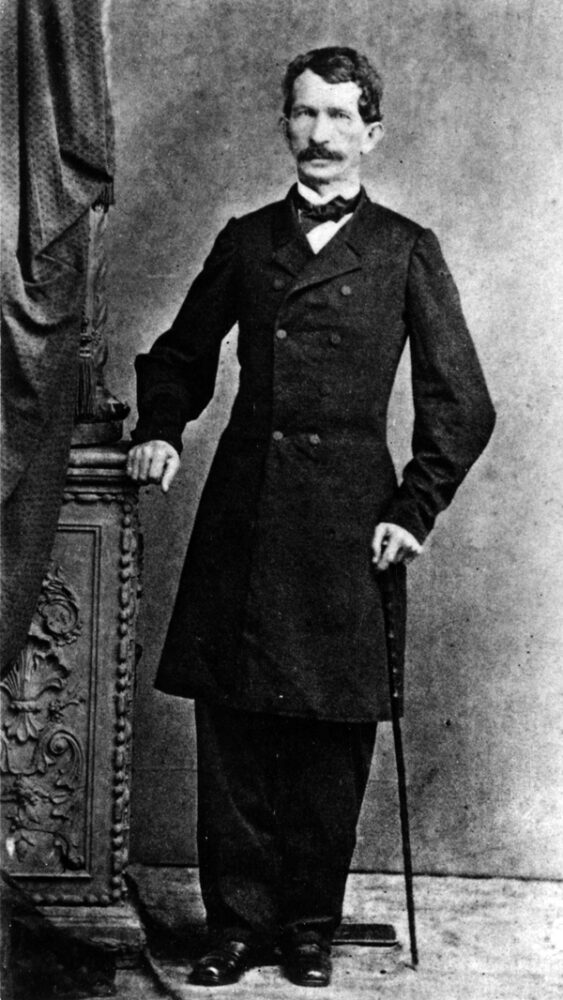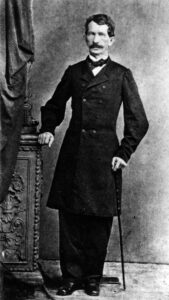Henry Watkins Allen
Inaugurated as governor of Confederate Louisiana on January 25, 1864, Henry Allen presided over the parts of the state controlled by the Confederates until June 2, 1865.

Courtesy of State Library of Louisiana
Governor Henry Watkins Allen. Unidentified
Inaugurated as governor of Confederate Louisiana on January 25, 1864, Henry Allen presided over the parts of the state controlled by the Confederates until June 2, 1865. He governed from Shreveport, the state’s capitol after the fall of Baton Rouge. Allen was considered among the most successful administrators in the Confederacy, demonstrating an unusual ability to maintain order in Louisiana despite the chaos of the Civil War. Before becoming governor, he served as a brigadier general in the Confederacy, suffering a wound at the Battle of Baton Rouge so severe that he needed crutches for the rest of his life.
Henry Watkins Allen was born in Farmerville, in Prince Edward County, Virginia, on April 29, 1820, the son of Dr. Thomas and Ann Watkins Allen. He moved to Lexington, Missouri, after the death of his mother in 1830. There he spent twelve months as a store clerk, and attended Marion College for two years. Allen ran away from home in 1837 and settled in Grand Gulf, Mississippi, where he taught school and studied law. He was licensed to practice as an attorney in Mississippi on May 25, 1841. Early in 1842, Allen joined Sam Houston’s Army of the Republic of Texas, but six months later he returned to Mississippi and married Salome Crane of Rodney, Mississippi. He was elected to that state’s legislature in 1845.
Allen moved to Louisiana in 1852 and built Allendale, an estate in West Baton Rouge Parish where he grew sugarcane. He traveled throughout the South in 1853, writing letters under the pseudonym Guy Mannering to the Baton Rouge Comet. His letters describing the land and its people were published as The Guy Mannering Letters of Henry Watkins Allen in 1985. He later traveled in Europe and wrote Travels of a Sugar Planter, published in 1861.
In 1854, after studying law at Harvard University, Allen was elected to the Louisiana state legislature where he served until the outbreak of the Civil War. He enlisted as a private in the Delta Rifles and was elected lieutenant colonel of the 4th Louisiana Regiment. He was a commander at Ship Island, Mississippi, and in March 1862, became colonel of the regiment and joined Pierre Gustave Toutant Beauregard in Tennessee. He was wounded at Shiloh on April 6, 1862, and again at Baton Rouge on August 5. He was commissioned brigadier general in September 1863 and ordered to Shreveport.
Allen ran unopposed for governor of Confederate Louisiana in 1863. During his term, he struggled to provide some sense of order for the increasingly poverty-ridden citizens of Louisiana, while supporting Confederate troops. He opened a trade route to Mexico through Texas, by which cotton was exported, and medicine, clothing, and other necessities were brought into the state. He also established a system of unified currency and state-run stores where citizens could buy basic supplies at low cost. By importing and distributing cotton cards (tools for combing cotton fibers), Allen helped private citizens spin and weave cotton—a commodity in short supply during this period. In addition, he maintained the public schools and opened two medical dispensaries in northern Louisiana.
After General Robert E. Lee’s surrender at Appomm Allen, as well as many other Confederates, fled to Mexico in June of 1865 where he edited an English-language newspaper, Mexican Times, in Mexico City. He died in Mexico on April 22, 1866, but his body was brought to New Orleans for interment with military honors. The ceremony was in Baton Rouge on July 4, 1885, beneath a monument erected in his memory on the Old State Capitol grounds.
This entry was adapted from the Dictionary of Louisiana Biography, a publication of the Louisiana Historical Association in cooperation with the Center for Louisiana Studies at the University of Louisiana, Lafayette.
Sources: Vincent H. Cassidy, and Amos E. Simpson, Henry Watkins Allen of Louisiana (1964); Emilia Gay Griffith Means, ed., The Guy Mannering Letters of Henry Watkins Allen: A Journey Through the South in 1853 (1985); Miriam G. Reeves, The Governors of Louisiana (1972).
